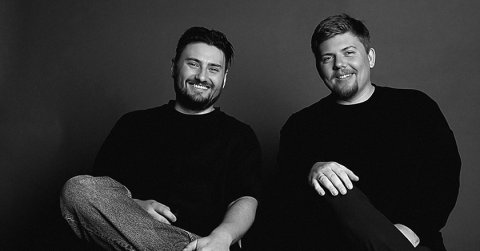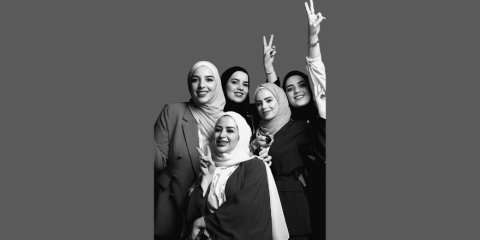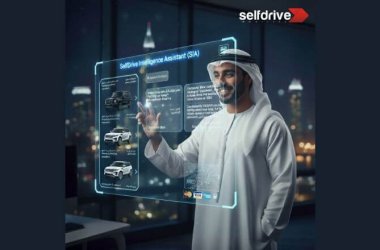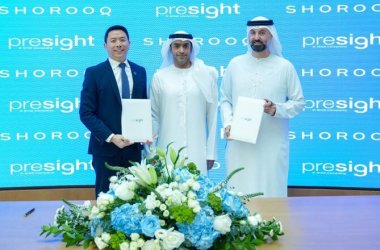
Founders Mitia Muravev and Peter Bondarenko share insights into how their groundbreaking studio is redefining self-portraiture in the GCC by blending technology, culture, and autonomy.
Photography in the GCC has traditionally been shaped by cultural sensitivities around modesty and privacy. Recognising the need for a new approach, self.space founders Mitia Muravev (CEO) and Peter Bondarenko (CPO) have created the region’s first AI-powered, privacy-first self-portrait studio. Combining advanced AI technology with stringent data security, self.space offers women an empowering space where they maintain absolute control over their images and self-expression. TahawulTech spoke with Muravev and Bondarenko to uncover how self.space is not only reshaping photography standards but also resonating deeply with the cultural values and personal empowerment of women across the region.
Interview Excerpts:
self.space was born from a very distinct cultural insight about privacy and modesty. What was the moment that inspired you to build a privacy‑first studio in the GCC?
Self‑portraiture isn’t new—the first shutter release came with the first camera—but dedicated self‑portrait studios are still a young trend. When we spotted it, we loved the idea yet saw it needed tailoring for the Gulf. During an early test booth in Dubai, we watched women edge past a traditional photo stand, then visibly relax when they realised ours had no photographer. One guest said, “No one is judging my abaya, my hair, my pose.” That single reaction framed our entire roadmap. We built around three pillars that matter deeply here: privacy, advanced technology and genuine hospitality. Respect those values and demand follows; ignore them and even the best tech stays unused.
You call self.space “a moment of radical self‑ownership.” How does your technology give women control, and how do you keep the AI authentic while still editorial‑grade?
The processing model belongs to us; we control every parameter—no third‑party software, no external API calls. Control starts at the shutter. The guest presses the remote, the raw file encrypts locally, and a one‑time password is sent only to her phone. The image then travels through an encrypted tunnel to our private GPU cloud, where our in‑house AI model lives. Because the model runs on a dedicated, isolated cluster that we manage—not a public service—we can tune every parameter and audit every call.
We trained that model on tens of thousands of portraits to strike a single balance: polish without disguise. It adjusts light and colour, calms minor skin distractions, yet protects freckles, pores and expression lines. We would rather leave a tiny blemish than cross into face‑changing beautification. The processed file returns to the guest’s gallery in seconds, still under her sole password. In short, she triggers the shutter, we handle the safeguarding, and she alone decides whether the image ever leaves her private vault.

After the MVP at Arab Media Summit, what feedback from Emirati women shaped the final studio?
We learned the most from the queues themselves. Women who shot with us on the first day came back the next morning half an hour before doors opened, this time bringing friends so they could shoot longer. Their enthusiasm highlighted two things. First, the core technology was solid; what needed polishing were the comfort cues—every button colour, the softness of the curtains, the timing of on‑screen prompts. We fine‑tuned those micro‑details so the room feels instantly relaxing. Second, the summit’s shaky internet exposed a bottleneck in our secure upload flow. Back at the lab we rewrote our compression, processing and encrypted‑transfer modules, so even with poor connectivity the system now runs smoothly. The most important feedback wasn’t verbal; it was their willingness to queue twice. That confirmed self.space is more than entertainment—it is a culturally meaningful service women are ready to claim as their own.
Privacy and data security are critical. What protocols guarantee absolute privacy and zero breaches? We built self.space on a privacy‑by‑design architecture rather than bolting security on later. Every step—from shutter click to gallery delivery—runs on isolated hardware inside the studio; no file ever travels to a public cloud.
“The moment a frame is captured, the system encrypts it locally and pairs it with a one‑time password sent only to the guest’s phone.”
Our in‑house AI model is more than a retoucher; it orchestrates the entire pipeline. It verifies that each capture was guest‑triggered, authenticates the device state, and blocks any attempt to export data outside the secure loop. The same model continuously checks file integrity, monitors for anomalous requests, and logs only anonymised session metadata for analytics. Staff dashboards can see usage statistics but never the images themselves.
On top of the automated checks, we run quarterly external penetration tests and follow a strict “minimal exposure” rule: if a subsystem is not essential for guest control, it stays disconnected. In practice that has meant zero breaches and zero incidents since our first pilot.
What is your long‑term vision, and how will you adapt self.space beyond Dubai?
Our goal is to make privacy‑first, self‑led portraiture as ordinary as a spa visit. The Dubai flagship proves the concept, mobile pop‑ups bring it to events, and next year we’ll open studios in Abu Dhabi, Sharjah, Doha and Riyadh. The core stack is portable, so localisation is surface work: multilingual mirror UIs here, a colour‑first mode there for fashion‑heavy markets. Long term we see a network of calm, tech‑light rooms across major cities where anyone can mark a life milestone—or simply refresh a profile photo—without stress. The broader we go, the more universal the idea of self‑ownership becomes.





